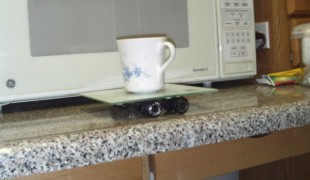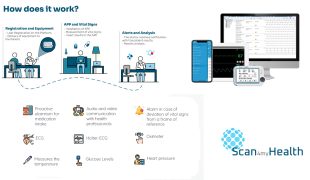- 2094
- 201
- 6
- 6
- 0
- Help Ukraine
About the solution
In 2005, after undergoing spinal surgery, Mark Moran faced an unexpectedly common yet serious problem: staying hydrated. With limited mobility, simple actions like reaching for a water glass became difficult. The water jug beside his hospital bed was often out of reach, empty, or too heavy to manage without assistance. This experience left him vulnerable to dehydration.
It was this personal challenge that led Mark to develop a practical solution: The Hydrant, a hands-free drinking system designed to support people with limited mobility. What started as a response to his own recovery needs became a product that today is used in hospitals, care homes, and private residences across the UK and beyond.
The Hydrant is a 1L water bottle with a flexible drinking tube and bite valve. It can be hung, hooked, or clipped to beds, wheelchairs, or chairs, offering instant and independent access to hydration. Users simply bite down on the valve and sip through the tube—eliminating the need for assistance, and reducing the risk of dehydration-related complications.
Its simple yet effective design has proven to have a wide-reaching impact. Hospitals using the Hydrant have reported fewer dehydration-related issues. Healthcare professionals benefit as well: with patients able to drink independently, staff can focus on other critical care tasks.
Since its launch, The Hydrant has become a standard fixture in many UK hospitals. In 2013, it received the Queen’s Award for Enterprise in Innovation, and it continues to be recognized as a high-impact innovation by the NHS.
Adapted from:
https://thehydrationfoundation.org/bios/mark-moran.html
https://www.youtube.com/watch?v=WyDUNY2nsyk
This solution shall not include mention to the use of drugs, chemicals or biologicals (including food); invasive devices; offensive, commercial or inherently dangerous content. This solution was not medically validated. Proceed with caution! If you have any doubts, please consult with a health professional.
DISCLAIMER: This story was written by someone who is not the author of the solution, therefore please be advised that, although it was written with the utmost respect for the innovation and the innovator, there can be some incorrect statements. If you find any errors please contact the patient Innovation team via info@patient-innovation.com
-
-
320
-
0
-
3684

Teacher Alex Truesdell is Transforming Lives: Adaptive Design Association Revolutionizes Disability Solutions
CAREGIVING
Drawing
Painting
Playing
BODY BALANCE: Maintaining body balance
(SELF)-CARE: DRINKING: Drinking independently.
(SELF)-CARE: EATING: Eating independently.
MOVING IN A WHEELCHAIR: Moving using a wheelchair.
Playing an instrument
Studying
Blindness
Hand Deformity
Neuromuscular Disorders
Assistive Daily Life Device (to help ADL)
Walking Aid (wheelchair/walker/crutches)
Restoring mobility
Replacing lost limbs
Enhancing health literacy
Promoting self-management
Promoting inclusivity and social integration
To improve Treatment/Therapy
Preventing (Vaccination, Protection, Falls, Research/Mapping)
Raise awareness
Caregiving Support
General and Family Medicine
Internal Medicine
Orthopedics
Pediatrics
Physical Medicine and Rehabilitation
United States
-
-
-
428
-
0
-
5241

Hot plate on wheels
-
-
-
296
-
1
-
3544

Scan4myHealth | Real-time solution for monitoring patient vital signs
CAREGIVING
COMMUNICATION: Communicating, whether by speaking, listening, or other means
Stroke
App (Including when connected with wearable)
AI algorithm
Assistive Daily Life Device (to help ADL)
Promoting self-management
To implement medical examination
Restoring heart health
Managing diabetes
Manage Medication
Rehabilitating After Stroke
Preventing (Vaccination, Protection, Falls, Research/Mapping)
Caregiving Support
Cardiology
General and Family Medicine
Internal Medicine
Physical Medicine and Rehabilitation
Pneumology
Portugal
-
 en
en